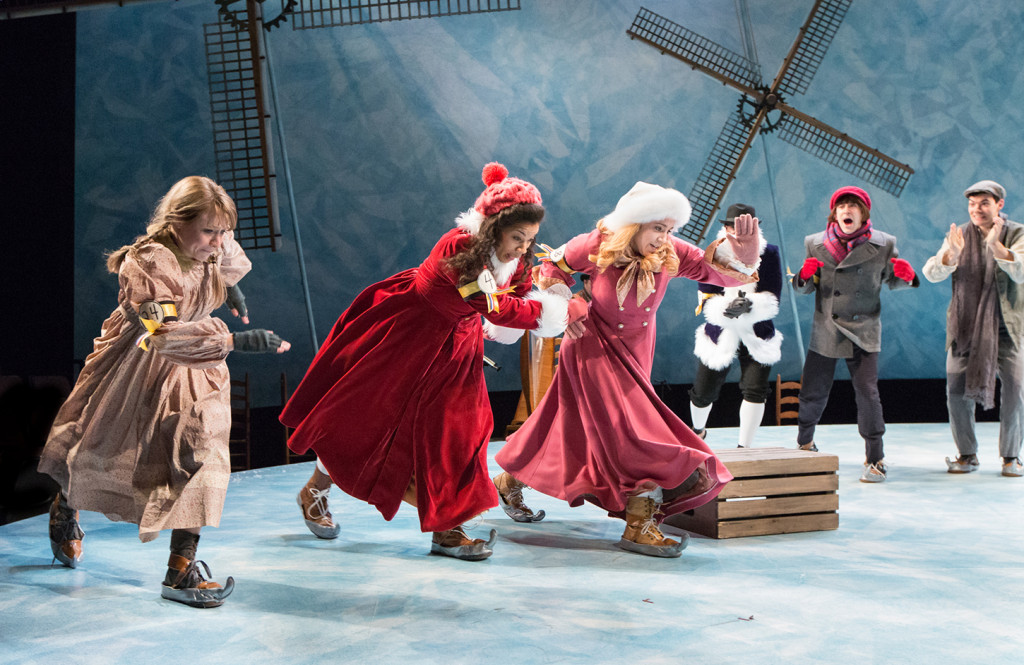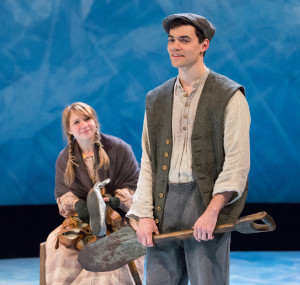
Arden Children’s Theatre never fails to entertain with its outstanding series of family-friendly productions; its world-premiere presentation of HANS BRINKER AND THE SILVER SKATES is no exception. But along with entertaining, Laura Eason’s stage adaptation of Hans Brinker or The Silver Skates—the beloved 1865 Dutch-themed children’s book by American writer Mary Mapes Dodge—is also an exceptional example of the power of theater to educate. Director Whit MacLaughlin’s approach to the play employs simple straightforward storytelling to focus on a meaningful lesson, in which hope triumphs over despair, understanding over thoughtlessness, and kindness over mean-spiritedness. It’s a good reminder for adults and children alike, not only during this holiday season, but always.
In Eason’s somewhat revised version, fifteen-year-old Hans (Brian Ratcliffe) has become the epitome of the Protestant work ethic in the ten years since his father’s catastrophic accident on the dikes—toiling and selling his meagre possessions to provide for his family, refusing to accept pity or charity without earning it, setting a good example for his little sister Gretel (Lauren Hirte), and spending what little spare time he has reading (“What will reading get you?” he is asked; “The world!” he replies). Gretel dreams of rising above their hardships and being accepted by the rich kids who taunt their poverty and their homemade wooden skates (a fantasy segment features Hirte performing the aerial acrobatics for which she is known in her signature role as Lookingglass Alice). Both remain steadfast, industrious, and supportive of each other and their struggling parents (Rachel Camp as Dame Brinker and Ed Swidey as father Raff).
In contrast with the Brinkers’ heartfelt honor, Steven A. Wright and Matteo Scammell are laughably dismissive and condescending as the imperious Doctor Boekman and his assistant, too busy to provide care to the injured Raff until it serves the physician’s personal ambitions and a reversal of circumstances results in his change of attitude. Camp, Wright, Scammell, and Ciji Prosser are the mean kids Katrinka, Carl, Peter, and Heidi, who call the Brinkers “rag-pickers” and exclude them from their privileged circle of friends, until the latter two recognize the error of their ways and help Hans and Gretel participate in a skating contest to win the titular prize. The entire ensemble captures the characters’ distinctive behavior with believability and clarity for audiences of all ages, and through quick costume changes by the actors playing dual roles.

David Gordon’s set establishes the Dutch locale with five rotating windmill blades and the icy blue sky and frozen river of a cold winter, and original live folk music by Jay Ansill, accompanied by members of the cast, underscores the intimate historic tone. Evocations of Vincent van Gogh’s sober painting of The Potato Eaters (1885) can be seen in the Brinkers’ modest garb (costumes by Rosemarie McKelvey), pendant metal lamp, and wooden chairs, providing a contrast with the exquisite 19th-century-style fashions, fine hand-painted glass-globed light, and silk-upholstered chair of the wealthier figures. Clever blocking of the skating and race sequences (called by Swidey as the announcer) includes carefree spins and falls skillfully performed by the actors in fabric “skates” on the glossy “river” and a slow-motion finale for the boys’ contest, which builds interest and delight in the outcome. The kids in the audience were quiet and attentive throughout the opening-night show, then cheered for the most kindhearted of the skaters and booed the nasty ones; they obviously got the message.
[Arden Theatre, F. Otto Haas Stage, 40 N. 2nd St.] November 24, 2015-January 31, 2016; ardentheatre.org.

One Reply to “HANS BRINKER AND THE SILVER SKATES (Arden): The sweet rewards of hope, understanding, and kindness”